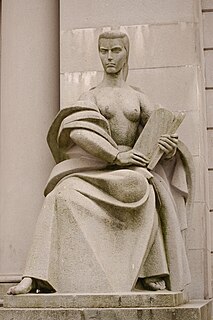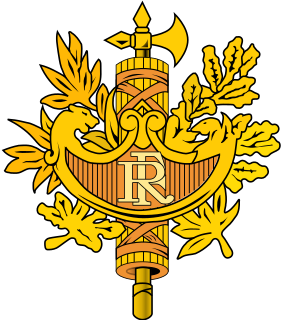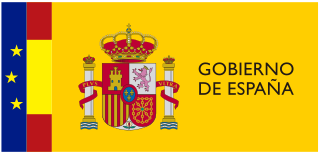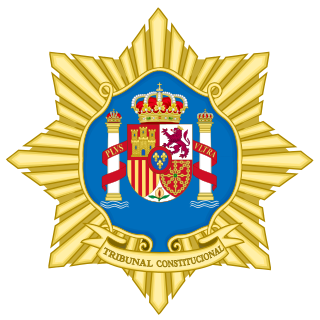The Government of Italy is a democratic republic established by a 1946 constitution. It consists of legislative, executive, and judicial subdivisions, as well as a Head of State, or President.

The Constitution for the Kingdom of the Netherlands is one of two fundamental documents governing the Kingdom of the Netherlands as well as the fundamental law of the European territory of the Kingdom of the Netherlands. It is generally seen as directly derived from the one issued in 1815, constituting a constitutional monarchy; it is the third oldest constitution still in use worldwide.
Promulgation is the formal proclamation or declaration that a new statutory or administrative law is enacted after its final approval. In some jurisdictions, this additional step is necessary before the law can take effect.
A decree is a rule of law usually issued by a head of state, according to certain procedures. It has the force of law. The particular term used for this concept may vary from country to country. The executive orders made by the President of the United States, for example, are decrees. In non-legal English usage, however, the term refers to any authoritarian decision. Documents or archives in the format of royal decrees or farming were issued by rulers.
The doctrine of nondelegation is the theory that one branch of government must not authorize another entity to exercise the power or function which it is constitutionally authorized to exercise itself. It is explicit or implicit in all written constitutions that impose a strict structural separation of powers. It is usually applied in questions of constitutionally improper delegations of powers of any of the three branches of government to either of the other, to the administrative state, or to private entities. Although it is usually constitutional for executive officials to delegate executive powers to executive branch subordinates, there can also be improper delegations of powers within an executive branch.
The Constitution of Finland is the supreme source of national law of Finland. It defines the basis, structures and organisation of government, the relationship between the different constitutional organs, and lays out the fundamental rights of Finnish citizens, and individuals in general. The original Constitution Act was enacted in 1919, soon after Finland declared its independence in 1917. The current draft of the Constitution came into force on 1 March 2000.

The Italian Parliament is the national parliament of the Italian Republic. The Parliament is the representative body of Italian citizens and is the successor to the Parliament of the Kingdom of Sardinia (1848–1861) and the Parliament of the Kingdom of Italy (1861–1946). It is a bicameral legislature with 945 elected members and a small number of unelected members (parlamentari). It is composed of the Chamber of Deputies, with 630 members (deputati) elected on a national basis, and the Senate of the Republic, with 315 members (senatori) elected on a regional basis, plus a small number of senators for life, either appointed or ex officio. The two houses are independent from one another and never meet jointly except under circumstances specified by the Constitution.

The Constitution of the Italian Republic was enacted by the Constituent Assembly on 22 December 1947, with 453 votes in favour and 62 against. The text, which has since been amended 15 times, was promulgated in the extraordinary edition of Gazzetta Ufficiale No. 298 on 27 December 1947. The Constituent Assembly was elected by universal suffrage on 2 June 1946, at the same time as a referendum on the abolition of the monarchy. The Constitution came into force on 1 January 1948, one century after the Statuto Albertino had been enacted. Although the latter remained in force after Benito Mussolini's March on Rome in 1922, it had become devoid of substantive value.

The Constitution of Colombia, better known as the Constitution of 1991, is the current governing document of the Republic of Colombia. Promulgated on July 4, 1991, it replaced the Constitution of 1886. It is Colombia's ninth constitution since 1830. See a timeline of all previous constitutions and amendments here. It has recently been called the Constitution of Rights.

The Law of Portugal is the legal system that applies to Portugal. It is part of the family of the civil law legal systems, based on Roman law. As such, it has many common features with the legal systems found in most of the countries in Continental Europe.
In Belgium, a decree is a form of legislation passed by community or regional parliaments, except by the Brussels Parliament.
The Law of Spain is the legislation in force in the Kingdom of Spain, which is understood to mean Spanish territory, Spanish waters, consulates and embassies, and ships flying the Spanish flag in international waters. It is also applicable to the Spanish armed forces worldwide. Spanish law stems from the Spanish people through democratically elected institutions. Equally, part of the legislation comes from the supranational institutions of the European Union, which also enjoy democratic legitimacy.
Judicial review is the procedure by which courts in Denmark assess whether laws are compatible with the constitution, and administrative acts are compatible with the law. The Constitution of Denmark does not expressly authorise the courts to review statutes, but the courts have inferred the right from its provisions.
The royal prerogative is a body of customary authority, privilege, and immunity, recognized in common law and, sometimes, in civil law jurisdictions possessing a monarchy, as belonging to the sovereign and which have become widely vested in the government. It is the means by which some of the executive powers of government, possessed by and vested in a monarch with regard to the process of governance of the state, are carried out.

The politics of France take place with the framework of a semi-presidential system determined by the French Constitution of the French Fifth Republic. The nation declares itself to be an "indivisible, secular, democratic, and social Republic". The constitution provides for a separation of powers and proclaims France's "attachment to the Rights of Man and the principles of national sovereignty as defined by the Declaration of 1789."
Parliamentary sovereignty is a concept in the constitutional law of some parliamentary democracies. It holds that the legislative body has absolute sovereignty and is supreme over all other government institutions, including executive or judicial bodies. It also holds that the legislative body may change or repeal any previous legislation and so it is not bound by written law or by precedent.
A Royal Decree-Law is a legal rule having the force of a law in the Spanish legal system. The name of "Royal" is given because it has state rank and it is the King who is responsible for sanctioning and ordering the publication and compliance of the rule. However, when the rule is created by an autonomous government, it receives the name of "Decree-Law" because the King only sanctions the Decrees of the central government.











